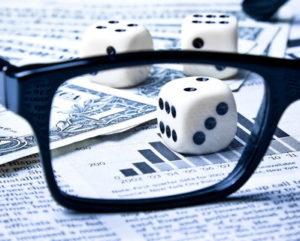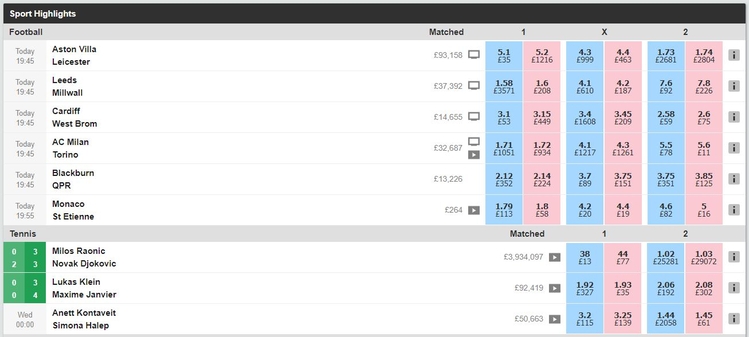 When you load up your favourite betting site and look at the odds available on a football match, tennis tournament or other event that you fancy having a wager on, you would be forgiven for asking yourself how the bookmaker has reached the conclusion that they have over the odds that they’re offering you.
When you load up your favourite betting site and look at the odds available on a football match, tennis tournament or other event that you fancy having a wager on, you would be forgiven for asking yourself how the bookmaker has reached the conclusion that they have over the odds that they’re offering you.
The whole purpose of some bettors is to look out for bookies that get their odds wrong, moving quickly to take advantage of the situation as best they can. Bookmakers, meanwhile, try to ensure that such errors never happen if they can avoid it.
One of the ways that they avoid making such mistakes is by ensuring that they have solid information available to them. Some of the odds are worked out by their in-house odds traders, whilst others are created thanks to software that look at data from numerous different places, including third-parties.
When bookies are compiling odds for horse races, for example, they will use stats, form-lines and ratings that they have been able to get from an outside company. They will also look at who is betting on what and how much money is being staked. In this way, they are able to ensure that it is unlikely that their odds will be wildly out of whack.
In-House Information
 The first place that a lot of bookmakers will start when it comes to compiling their odds is in-house. In the vast majority of instances, the biggest bookies will have odds compilers and expert traders that have made it their career to figure out what odds a given event should have attached to it.
The first place that a lot of bookmakers will start when it comes to compiling their odds is in-house. In the vast majority of instances, the biggest bookies will have odds compilers and expert traders that have made it their career to figure out what odds a given event should have attached to it.
They will look at information from a wealth of sources, but ultimately it will come down to their own judgement. As the years have progressed and technology has become an important part of every facet of life, it has also become a crucial part of how odds compilers work.
In the past, odds compilers would depend on the likes of intuition, feel and even their own experiences. Nowadays, it is as much about mathematical models, statistics and databases that they are able to look towards. This, of course, has removed the need for experts who would be able to look at how a horse was going around a parade ring and know how they were likely to run. That bit of expertise has slipped away from the industry, although what is needed now is just as specialised but in a completely different way.
Odds compilers can look at a wealth of information from numerous different sources and figure out what it means. That allows just one or two traders to oversee several horse racing meetings or football matches at the same time, merely inspecting the work that their proprietary computer programmes have done to create odds.
This is in stark contrast to the days when each race meeting, football match or tennis tournament would require its own specialist odds compiler. This was a necessity once the likes of In-Play markets became de rigueur.
Third-Party Data
 It would be untrue to say that experts in their field don’t exist any more in the world of betting, but it is also the case that third-party data is the more common way that bookmakers gain information when making up their books.
It would be untrue to say that experts in their field don’t exist any more in the world of betting, but it is also the case that third-party data is the more common way that bookmakers gain information when making up their books.
The days of using statistical odds compilers, who would look at the likes of how many times team A won at home and how often they beat team B and then come up with odds, are as good as dead. Indeed, nowadays, it as much about knowing what the punters are likely to do as it is thinking about the actual odds of a situation.
That being said, one of the chief things that bookies are able to do nowadays is to look at information that they are sent by third-party companies. The best example of this is horse racing, thanks largely to the amount of statistical analysis that is done around the sport.
Consequently, there are companies out there that specialise in sending bookmakers information on the likes of the ratings of horses, how they have run with certain weights in the past for handicap events, what their stats are at a given racecourse or a specific starting gate and so on.
On-Course Bookmakers
 Though on-course bookies will always have an idea both on their rivals on the track and also remain in contact with people on the outside, the old-fashioned version of bookmaking is still in existence in the world of on-course bookies.
Though on-course bookies will always have an idea both on their rivals on the track and also remain in contact with people on the outside, the old-fashioned version of bookmaking is still in existence in the world of on-course bookies.
That is to say, having connections in the industry remains important for bookmakers that are operating in the physical environment of the race course. Being told by a trainer friend that their horse is looking in great nick, or alternatively has been struggling to get going in the yard, is worth more than any third-party statistical analysis software.
Not that on-course bookies aren’t liable to being hit by shrewd operators, of course. Someone that has a sense of their horse doing will will hold off on their bets for as long as possible, allowing wagers to be placed on other horses so as to let the price of theirs drift out.
Then they will move to place a big bet, leaving the on-course bookies to wonder what happened, all whilst trying to cover their own liabilities with other bookmakers around the place. In such an instance, no amount of information gathering can stop them from being punished.
Betfair And Exchanges
 In the modern era, nothing has influenced how bookmakers work quite like betting exchanges. Of the various betting exchanges that operate, none are in the same league as Betfair. Indeed, the betting exchange is so influential that there is now a thing called the Betfair Starting Price, which is seen by many as being a more reliable measure of a horse’s actual price at the start of a race than the old way of taking an average of on-course bookmakers’ prices. This is all thanks to the peer-to-peer model used by exchanges.
In the modern era, nothing has influenced how bookmakers work quite like betting exchanges. Of the various betting exchanges that operate, none are in the same league as Betfair. Indeed, the betting exchange is so influential that there is now a thing called the Betfair Starting Price, which is seen by many as being a more reliable measure of a horse’s actual price at the start of a race than the old way of taking an average of on-course bookmakers’ prices. This is all thanks to the peer-to-peer model used by exchanges.
If you want to know what punters think of an event, have a look to see how they’re betting on the exchange. This will give you a pure notion of what real people think should be the odds of a horse, football team or tennis player. Because of the way that exchanges work, taking a percentage of the winnings from a punter, they do not need to build in an Edge in the same way as a bookmaker does in order to make a profit. Consequently, the odds that are offered on betting exchanges are closer to the ‘true’ odds of an outcome happening.
How people respond to the market on a betting exchange like Betfair can be used by bookmakers to assess their own odds. Are punters betting heavily on something that a bookie has got at long odds? If so, the chances are that they got those odds wrong in the first place and it would be sensible to make an adjustment accordingly. As a punter, you can look at how the market is responding on the exchange and move to take advantage of a bookmaker that has made an error, using their own work against them where possible.
Compiling The Markets

Once they have done their research, crunched the numbers or used their intuition, bookmakers need to make a decision about how they will compile the market. Each will do their own thing on this front, with some choosing to lead the way and others deciding to hang back and copy what everyone else is doing.
Those that choose to take an early position are putting their heads above the parapet and leaving themselves exposed to being taken advantage of. If they do that, therefore, they need to be relatively confident that they’ve got their odds right in the first place.
There is no perfect way of compiling a market. Each bookmaker will have their own way of doing it and that way will have flaws. The job of the bettor is to try to figure out what those flaws are and move to take advantage. Even those that wait to see what other companies are doing first are still liable to losing money if the companies that they’re copying have got the odds wrong in the first place.
One of the best things that you can look to do as a punter is to come up with your own odds for an event, then you can see when bookies have got it wrong.
This, of course, will involve holding your nerve from time to time. If you think you’ve got the odds right on an event, you can’t be swayed in your opinion by what bookmakers are doing. Aside from everything else, it is worth bearing in mind that bookies will change the odds on something because lots of bets have been placed on it, or lengthen the odds on something else if no one is betting on it.
If you think that you’ve figured out what the odds should be and they don’t reflect what the bookies are offering, either place your bets or don’t based on what you’ve worked out, now what the markets are doing.
